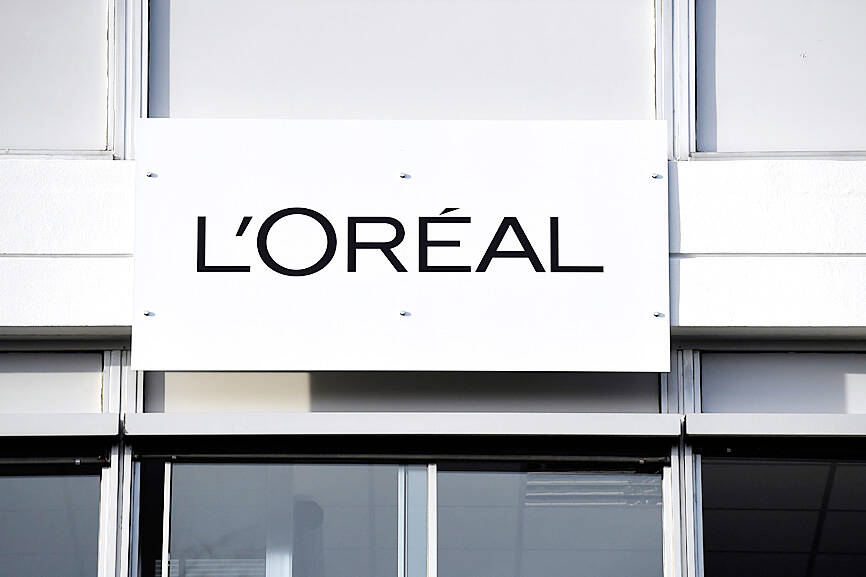L’Oreal SA sales disappointed as the owner of Lancome suffered from a decline in shopping by Chinese travelers.
Sales at the cosmetics group rose 6.9 percent on a like-for-like basis in the fourth quarter of last year, the French company said on Thursday, trailing estimates. Revenue from North Asia dropped 6.2 percent, while analysts had expected it to be little changed.
“The key question here will be how long China remains soft,” Morgan Stanley analyst Sarah Simon said in a research note. She expects tough comparisons in the first half of the year and “a much better picture” in the second half.

Photo: AFP
The performance in North Asia, which includes China and South Korea, continued to suffer from a challenging travel retail market, which weighed in particular on its premium unit, L’Oreal Luxe. That division includes labels such as Lancome and the recently integrated Aesop, which L’Oreal bought last year.
“North Asia continued to be impacted by the reset in Travel Retail following the change in policy regarding ‘daigous,’” the company said, referring to the practice of Chinese tourists buying on behalf of others when traveling.
Despite the drag from Asia, L’Oreal’s resilience stands in contrast to its US rival Estee Lauder Cos, which earlier this week announced plans to cut as much as 5 percent of its workforce as it loses market share.

Photo: Reuters
L’Oreal’s dermatological beauty unit, which includes labels such as La Roche-Posay, grew by 27 percent and topped estimates. North America sales also beat expectations.
The company will continue to outperform the beauty market, L’Oreal chief executive officer Nicolas Hieronimus said in the statement.
Separately, Hermes International SCA’s sales surged at the end of last year as the Birkin bag maker weathered the slowdown in demand for luxury goods with its unique model driven by scarcity.
Fourth-quarter revenue climbed 17.5 percent at constant exchange rates, Hermes said in a statement yesterday.
The company also announced plans for an exceptional dividend of 10 euros a share.
Despite a cooling in demand for luxury products following the post-pandemic boom, Hermes’ brand still lures wealthy customers willing to splurge on its hard-to-get handbags and pricey silk scarves. All the main divisions of the Paris-based company grew by at least 10 percent.
In a call with reporters, Hermes executive chairman Axel Dumas said the company plans product price hikes of 8 percent to 9 percent on average this year.
Recurring operating income for the year rose to 5.65 billion euros (US$6.1 billion), topping analysts’ estimates.

The Eurovision Song Contest has seen a surge in punter interest at the bookmakers, becoming a major betting event, experts said ahead of last night’s giant glamfest in Basel. “Eurovision has quietly become one of the biggest betting events of the year,” said Tomi Huttunen, senior manager of the Online Computer Finland (OCS) betting and casino platform. Betting sites have long been used to gauge which way voters might be leaning ahead of the world’s biggest televised live music event. However, bookmakers highlight a huge increase in engagement in recent years — and this year in particular. “We’ve already passed 2023’s total activity and

Nvidia Corp CEO Jensen Huang (黃仁勳) today announced that his company has selected "Beitou Shilin" in Taipei for its new Taiwan office, called Nvidia Constellation, putting an end to months of speculation. Industry sources have said that the tech giant has been eyeing the Beitou Shilin Science Park as the site of its new overseas headquarters, and speculated that the new headquarters would be built on two plots of land designated as "T17" and "T18," which span 3.89 hectares in the park. "I think it's time for us to reveal one of the largest products we've ever built," Huang said near the

BIG BUCKS: Chairman Wei is expected to receive NT$34.12 million on a proposed NT$5 cash dividend plan, while the National Development Fund would get NT$8.27 billion Taiwan Semiconductor Manufacturing Co (TSMC, 台積電), the world’s largest contract chipmaker, yesterday announced that its board of directors approved US$15.25 billion in capital appropriations for long-term expansion to meet growing demand. The funds are to be used for installing advanced technology and packaging capacity, expanding mature and specialty technology, and constructing fabs with facility systems, TSMC said in a statement. The board also approved a proposal to distribute a NT$5 cash dividend per share, based on first-quarter earnings per share of NT$13.94, it said. That surpasses the NT$4.50 dividend for the fourth quarter of last year. TSMC has said that while it is eager

China yesterday announced anti-dumping duties as high as 74.9 percent on imports of polyoxymethylene (POM) copolymers, a type of engineering plastic, from Taiwan, the US, the EU and Japan. The Chinese Ministry of Commerce’s findings conclude a probe launched in May last year, shortly after the US sharply increased tariffs on Chinese electric vehicles, computer chips and other imports. POM copolymers can partially replace metals such as copper and zinc, and have various applications, including in auto parts, electronics and medical equipment, the Chinese ministry has said. In January, it said initial investigations had determined that dumping was taking place, and implemented preliminary